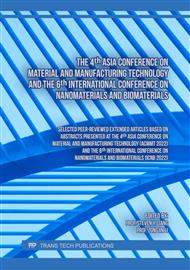[1]
Gao, Y., L.P. Chen, and M. Ehsani, Investigation of the effectiveness of regenerative braking for EV and HEV. SAE Trans., 1999: pp.3184-3190
DOI: 10.4271/1999-01-2910
Google Scholar
[2]
Rajashekara, K., Power conversion and control strategies for fuel cell vehicles. In Proceeding of the 29th Annual Conference of the IEEE Industrial Electronics Society,2004. 3: pp.2865-2870.
DOI: 10.1109/iecon.2003.1280702
Google Scholar
[3]
Zolot, M., T. Markel, and A. Pesaran, Analysis of fuel cell vehicle hybridization and implications for energy storage devices. Proceedings of the 4th advanced automotive battery conference, 2004: pp.121-124
Google Scholar
[4]
Guo, J.G., J.P. Wang, and B.G. Cao, Regenerative braking strategy for electric vehicles. Proceedings of the IEEE Intelligent vehicles symposium, 2005: pp.864-868.
DOI: 10.1109/ivs.2009.5164393
Google Scholar
[5]
Li, X.J., et al., Regenerative braking control strategy for fuel cell hybrid vehicles using fuzzy logic. Proceedings of the International conference on electrical machines and systems 2008: pp.712-2716.
Google Scholar
[6]
Cao, J.B., et al., Neural network self-adaptive PID control for driving and regenerative braking of an electric vehicle. Proceedings of the IEEE International Conference on Automation and Logistics, 2007: pp.2019-2034.
DOI: 10.1109/ical.2007.4338908
Google Scholar
[7]
Mehrdad Ehsani, Y. Gao, and A. Emadi, Morden electric, hybrid electric, and fuel cell vehicles: Fundamentals, theory, and design, 2nd ed 2010: CRC Press
DOI: 10.1201/9781420054002
Google Scholar
[8]
W. K. Yap, and V. Karri. Modeling and Simulation of a Hybrid Scooter. World Academy of Science, Engineering and Technology 47, (2008)
Google Scholar



